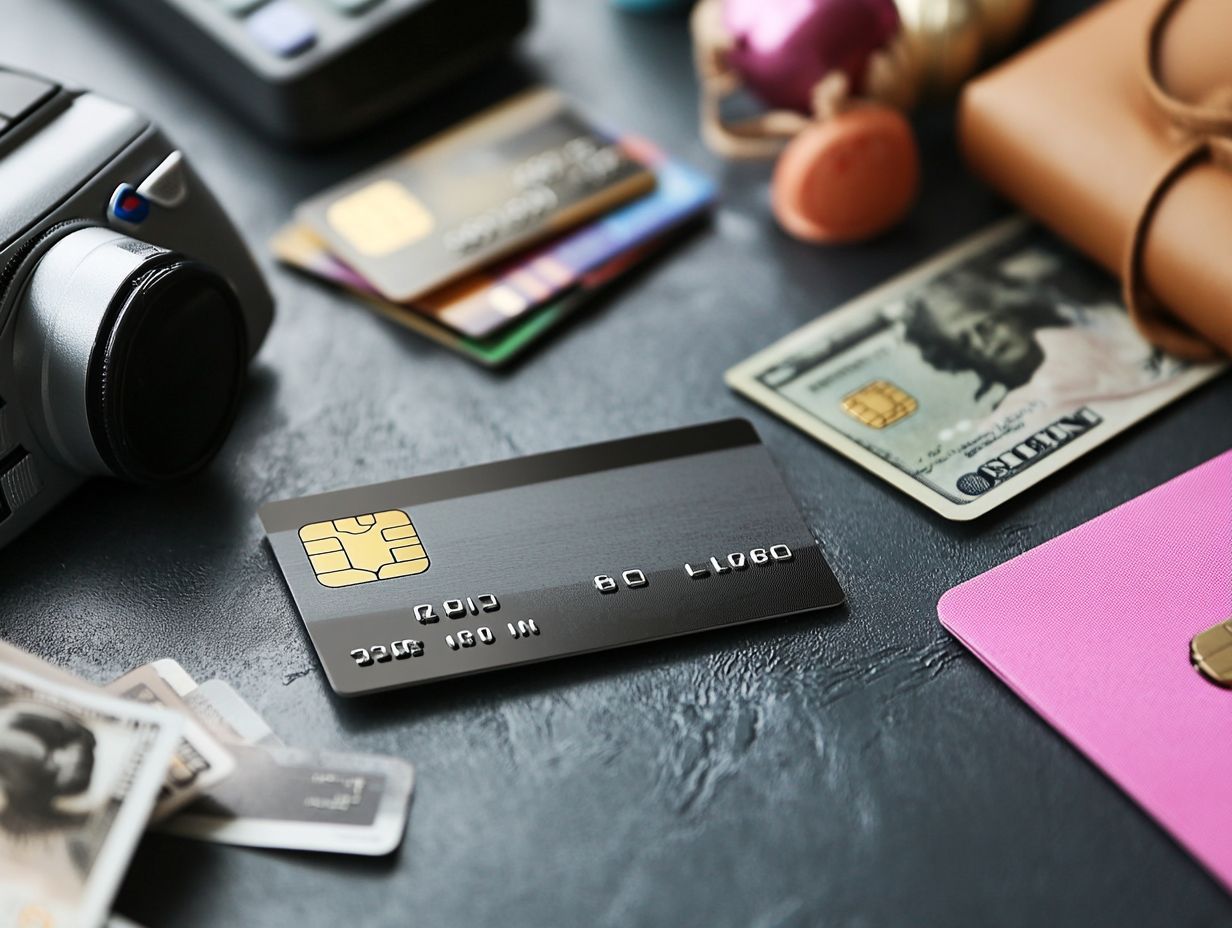5 Mistakes to Avoid with Rewards Cards
Navigating the world of rewards cards can be a truly enriching experience both figuratively and literally. You might unknowingly make mistakes that could diminish the benefits your cards offer.
From overlooking the fine print to failing to maximize your rewards, these missteps can cost you far more than you might realize. This article delves into the five common pitfalls to avoid with rewards cards, explores what these cards are and how they function, and provides invaluable tips for selecting the right one that aligns with your lifestyle.
Whether you re a seasoned aficionado or just starting your rewards journey, understanding these concepts can empower you to fully capitalize on your rewards. Keep reading to unlock the complete potential of your rewards card!
Contents
Key Takeaways:
Here are the essential tips you must know to make the most of your rewards cards!
- Read the fine print before signing up for a rewards card to avoid unexpected fees and restrictions.
- Consider annual fees when choosing a rewards card to ensure that the benefits outweigh the cost.
- Maximize rewards by strategically using your card for purchases and taking advantage of bonus categories.
- Pay off your credit card balance in full each month to avoid accruing high interest charges.
- Track your expenses and stay within your budget to maximize rewards and avoid overspending.
1. Not Reading the Fine Print
One of the most common pitfalls in personal finance is overlooking the fine print in credit card agreements. This oversight can lead to unexpected late payments, hidden interest fees, and misunderstandings about the minimum payments required by various card issuers, including reputable names like American Express and Chase.
Such neglect can severely undermine your budgeting efforts and impact your overall credit score. Failing to grasp terms related to interest rates, annual fees, and late payment penalties might leave you ensnared in a cycle of debt, with financial strain steadily increasing. An uninformed approach can lead to unexpected charges that derail even the most meticulously crafted budgets.
By taking the time to understand these agreements, you equip yourself with the insights necessary to make informed decisions. This ultimately fosters better financial health and paves the way for long-term stability.
2. Not Considering Annual Fees
Ignoring the annual fees tied to credit cards can significantly impact your financial decisions, especially if you re counting on consumer-friendly rewards or travel perks that may not make the cost of the card s annual fee worthwhile.
When selecting a credit card, evaluate how these fees align with your personal budgeting goals. For example, a card with a $95 annual fee might seem costly at first glance, but if it offers 3% cash back on groceries and enticing sign-up bonuses, those rewards could easily offset that fee.
Cards like the Chase Sapphire Preferred or Capital One VentureOne often find a sweet spot, providing desirable perks while keeping annual costs manageable. Analyze your spending habits to ensure the benefits not only cover the fees but also enhance your overall financial health.
3. Not Maximizing Rewards
Many credit card holders miss the chance to fully capitalize on their rewards potential, often ignoring bonus categories and spending thresholds. To maximize your benefits, consider following tips for using a credit card responsibly, which can significantly boost your points accumulation.
This oversight results in lost opportunities to earn more rewards through strategic spending. By concentrating on categories like travel, dining, or groceries, you can ensure your purchases align with these lucrative areas. For more insights, check out what you need to know about rewards cards to amplify your rewards.
Establishing a tracking system helps keep your spending in check and allows you to identify which categories provide the highest returns. Utilize budgeting tools or apps for monitoring these expenses, assisting you in staying organized while making informed decisions about where to channel your spending for optimal point redemption.
4. Not Paying Off Balances in Full

Failing to pay off credit card balances in full can trap you in high-interest debt. This can negatively impact your credit utilization ratio the amount of credit you use compared to what you have available and your overall financial health. This is especially concerning with steep APR (Annual Percentage Rate) offers on cash advances.
When balances roll over each month, interest can accumulate, causing your credit score to suffer. This makes future borrowing not only more difficult but also more expensive. A high utilization ratio sends a red flag to lenders, suggesting you might be overextended. This could lead to higher interest rates and lower chances of loan approval.
To cultivate a healthier financial situation, you must adopt a solid budgeting strategy, such as the 50/30/20 rule. Prioritizing consistent payments that exceed the minimum can help you chip away at that debt. Setting up automatic payments and utilizing budgeting apps are effective tactics in your quest for financial stability. Regularly reviewing your finances will help steer you clear of those pesky interest traps.
5. Not Tracking Expenses
Neglecting to track your expenses can significantly derail your personal finance journey. It complicates your ability to manage spending categories and effectively utilize budgeting apps or financial tools to maintain control over your finances.
Understanding the flow of your money is crucial for cultivating healthy budgeting habits and achieving your financial goals. When you actively monitor your expenditures, you can identify patterns, eliminate unnecessary costs, and make informed decisions about where to allocate your resources.
By implementing simple practices like categorizing your spending or setting up budget limits with dedicated tools, you foster a sense of accountability. Mobile apps like Mint and YNAB offer intuitive interfaces that not only help you track where your money goes but also allow you to visualize spending trends over time. These tools provide reminders and insights that empower you to make smarter financial choices.
What Are Rewards Cards and How Do They Work?
Rewards cards are specialized credit cards designed to enhance your spending experience by offering a variety of enticing incentives, such as cash back, travel rewards, and flexible points systems. You can choose from diverse redemption options based on the points policy of your card issuer.
These cards allow you to earn points or cash back on your everyday purchases, often at an accelerated rate for certain spending categories, like dining or travel. For example, with Discover s Cashback Rewards program, you can earn a remarkable 5% back on rotating categories. Meanwhile, Capital One’s Venture Rewards credit card allows you to rack up 2 miles per dollar on every purchase ideal for frequent travelers.
You ll find that redeeming these rewards is straightforward and flexible. Whether you opt for statement credits, travel bookings, or even merchandise, you can maximize the benefits of your everyday spending and enjoy the perks that come with being a savvy rewards cardholder.
What Are the Different Types of Rewards Cards?
You ll discover a variety of rewards cards, each tailored to fit different spending habits and preferences. Whether it s cash back cards, travel credit cards, or those designed with consumer-friendly rewards in mind, there s something for everyone.
If you often shop at grocery stores or major retailers, cash back cards offer a straightforward way to earn money on your everyday purchases. For frequent travelers, travel credit cards can be game-changers, providing airline miles, hotel points, and other travel-specific perks that can significantly lighten your vacation expenses.
Some cards are tailored for specific spending categories, like dining or gas, enabling you to maximize your rewards based on where you spend the most. By understanding these nuances, you can create a rewards strategy that aligns perfectly with your lifestyle and spending behavior.
Start tracking your expenses today to take control of your financial future!
How Can One Choose the Right Rewards Card for Their Needs?

Selecting the ideal rewards card requires a thoughtful examination of your spending habits, a keen understanding of the benefits offered by various cards, and a choice of an issuer that aligns seamlessly with your financial goals and lifestyle.
To embark on this journey, start by categorizing your expenses think groceries, dining, travel, and entertainment. This shows where your money goes. It helps you pinpoint your key spending areas. Next, it’s essential to compare different cards, weighing their annual fees against the potential rewards. Some cards boast enticing rewards structures, like cash back or travel points, specifically designed for certain spending categories.
Consider adding authorized users to your account. This can enhance your rewards accumulation while instilling responsible credit practices.
What Are the Benefits of Using Rewards Cards?
Rewards cards can unlock amazing benefits that you don t want to miss! From earning cash back to accumulating travel perks, they also foster healthier financial habits.
By strategically employing these financial tools, you can turn everyday purchases into valuable rewards, transforming routine spending into a source of income or adventure. For example, many rewards cards provide elevated points for specific categories like dining or groceries, allowing you to maximize your earnings on expenses you would incur regardless.
Understanding how to use your rewards can lead to smarter, more deliberate choices, encouraging savings through incentives that promote thoughtful purchasing. Plus, many programs feature bonus offers or promotional periods that can significantly enhance their value. Staying informed and actively managing your rewards is key to fully reaping those financial benefits.
What Are the Common Mistakes People Make with Rewards Cards?
Common mistakes with rewards cards often involve overlooking bonus categories, missing payments, and failing to grasp the maximum earning limits. To avoid these pitfalls, consider following 5 tips for applying for rewards credit cards, as all of these factors can significantly hinder the potential benefits these cards offer.
Many individuals tend to get caught up in the allure of sign-up bonuses, neglecting to track their ongoing spending patterns that could yield even greater rewards. It s crucial for you to understand how various categories like dining, travel, and groceries work. To truly maximize your rewards, you’ll want to align your purchases with these categories.
Timely payments are essential; missing them can lead to interest charges that swiftly erode any rewards you’ve accumulated. By elevating your financial literacy, which means understanding how to manage your finances wisely, you can effectively navigate your options and enjoy the benefits while steering clear of common mistakes in credit card applications associated with rewards cards.
How Can One Avoid These Mistakes and Maximize Their Rewards?
To avoid common rewards card mistakes and truly maximize your benefits, it’s essential to leverage financial tools and budgeting apps. Additionally, learning how to avoid pitfalls with travel credit cards can enhance your experience. These resources will help you effectively track your expenses and understand your rewards card’s points policy.
By consistently monitoring your spending, you can easily keep an eye on which bonus categories you re utilizing, ensuring that you capitalize on every rewards opportunity available. Don t wait! Set up alerts for payment deadlines now to avoid late fees.
Familiarizing yourself with your card’s features, such as promotional offers or tiered rewards, gives you the power to make more informed spending choices. By integrating these practices into your financial routine, you ll enjoy a smoother rewards experience and truly make the most out of your purchases.
Frequently Asked Questions

What are the 5 mistakes to avoid with rewards cards?
The 5 mistakes to avoid with rewards cards are 1) not paying off your balance in full each month, 2) not understanding the terms and conditions, 3) overspending to earn more rewards, 4) not redeeming rewards in a timely manner, and 5) not considering the annual fees. For more insights, check out this guide on how to avoid common mistakes with cash back cards.
How does carrying a balance affect my rewards card?
Carrying a balance on your rewards card can lead to interest charges, which might outweigh the benefits of the rewards you earn. That’s why it’s important to explore unique rewards credit cards that suit your spending habits.
What should I know about my rewards card terms?
Understanding your rewards card’s terms is crucial. To avoid surprises, it’s important to know the interest rate, fees, and expiration dates, as well as how to use rewards cards responsibly.
Is overspending for rewards a good idea?
No, overspending can increase your balance and lead to high interest charges. Stick to your budget and only spend what you can pay off each month.
Why should I redeem rewards promptly?
Many rewards have expiration dates or can lose value. Redeem them quickly to get the most out of your rewards.
Are annual fees important when choosing a rewards card?
Yes, annual fees can affect the overall value of your rewards. Ensure that the rewards justify the fees before choosing your card.






